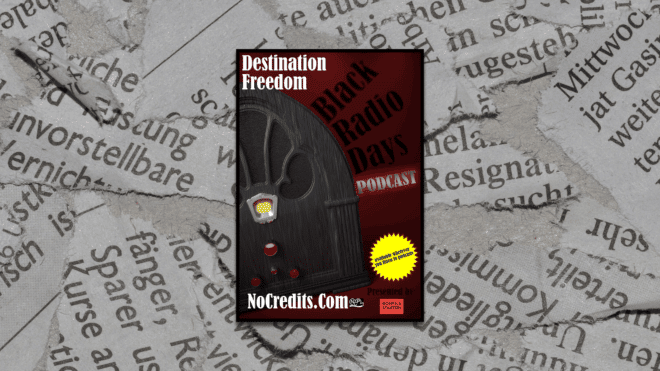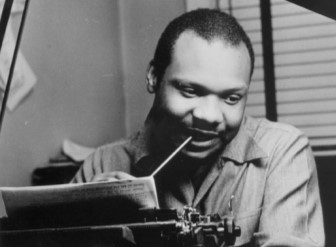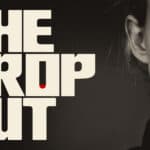Destination Freedom: One For the History Books

If there’s anything I’ve noticed in the recent years it’s that June has greatly overshadowed the patriotic nature of July, namely in terms of their respective holidays. Independence Day certainly has a more predominant hold on American culture with its heat, hot dogs, and fire works, but it seems lately that the nineteenth of June, often known as the portmanteau Juneteenth, has gained just as much, if not far more important meaning to the American people and the world as a whole.
A shift in political powers over the past decade, a certain number of controversial events ranging from good to terrible, and a general change in tune about the socioeconomic condition of the average black American is as big a talking point more than ever lately.
So what better way to acknowledge the month my ancestors could (kinda) be their own people than with No Credits Productions’ Destination Freedom: Black Radio Days, which is a celebration of the most culturally impactful moments in black history as well as the average news headline through the eyes of the modern African American citizen.
Despite the lofty introduction, I feel a bit out of my depth talking about this particular show. Not that I’m not a black woman living in the waking, capitalist hell that is North America, not that I don’t already talk about the fundamentals of radio drama, not that I wasn’t specifically asked via email to give this show a listen, but that this is the first time in all my years of journalism that I’ve covered a piece of media that heavily precedes the time I was even born.
Reading a timestamp like 1948 on a Wiki page is the kind of thing to put hair on your chest and almost inspires me to add “historian” to my long list of occupations. It’s just surreal to be covering anything that existed even before my parents were alive and even my fetish for nostalgia often doesn’t land me in the lap of the 1950’s beyond the occasional Pinterest board that talks about milkshakes and poodle skirts instead of all the institutionalized racism.
Podcasts in general already work as a homage to the earliest incarnations of radio drama, some of which deliberately evoking a grainy audio format, and I highly doubt some of my personal favorites would even exist if Orson Welles didn’t trigger mass panic with “The War of the Worlds” in 1938. We wouldn’t have books without messages carved into stone tablets after all, let alone laptops if we weren’t relying on chunky, dial-up desktop monitors.
As someone who also constantly has their foot stuck in the past, I can’t help but encourage that kind of ambition.
But it was only a deep dive into researching Destination Freedom: Black Radio Days on my own laptop that led me to even know about the show’s rich history. Once a traditional radio show-as in the ones that existed before streaming existed and owning a radio was actually mandatory-started on January 27, 1948 by Richard Durhman, it served as a rather groundbreaking discussion of the accomplishments of African Americans from multiple points in time. From Frederick Douglas to Harriet Tubman, Durham and his crew offered a fresh perspective on the scope of black heroes from scientists to freedom fighters to politicians for a whole two years with over a hundred episodes under their belt.
I want to give a personal thanks to the article Power, Politics, & Pride: Durham’s Destination Freedom on interactive.wttw.com which offered an excellent summary on the show’s past and even an audio excerpt in all its crusty, crackly vinyl glory just for that extra bit of streetcred, but it’s the reboot that’s caught my attention as of late.

Truly keeping up with the times, a stretch of available episodes started in 2020 and is still running today on Spotify. It seems No Credits Productions is taking up the helm of the many actors, narrators, and storytellers immortalized through sepia photos and continuing a legacy of sorts with the help of our modern technology. And as someone who also constantly has their foot stuck in the past, I can’t help but encourage that kind of ambition.
To say “Destination Freedom” is simply social commentary or just an audio drama would be doing it a disservice as it has just a little bit of everything. One episode could be a fairly well reenacted short story about the interpersonal struggles of the slavery or Jim Crow era and the next could be a real interview about something as recent as the Black Lives Matter movement or the disastrous effects of COVID-19.
Luckily, quality control between both the more sensationalized and realistic segments both receive the same level of audio polish. Though the short stories get the luxury of voice acting and narration, even the one-on-one conversations are kind of enough to be concise, cleanly conducted and easy to follow.
The part of me that personally prefers storytelling of course likes the theatrics “Destination Freedom” likes to dip its toe in, but it’s the interviews and real-life current events that provides the whole package. Much like director’s commentary or author’s notes, there’s something authentic about the blend of genres. It provides a nice context and contrast between the new and old ways African Americans have been treated in society and to see the problems or accomplishments we have now mirror that of the most iconic of black history makers is weirdly satisfying.
It makes you wonder if we would have a Barack Obama or Oprah Winfrey or Simone Biles today if we didn’t have fire starters like Harriest Tubman and Rosa Parks clearing the path first, talking down to their oppressors and truly sparking a difference by facing the ugliest parts of systematic oppression head on. And to have all of these names be equally relevant in a show like this is what makes Destination Freedom a rather solid listening experience. It truly does leave no stone unturned and if it hasn’t yet, you just know it’s hiding in the drafts somewhere.
Read more: Black History Month: Integrated Diversity in Podcasting
Acting is usually solid though sometimes the blend of accents can discount the otherwise good performances. And with the often heavy subject matters at play, hearing a somewhat cartoonish Scottish brogue unintentionally cheapens the experience. It’s just a little too easy to tell when someone is putting on a fake inflection which is an effort I can appreciate for historical accuracy, but also find just as unintentionally hilarious.
And paired with some of the interjected songs and swooning, soulful narration, the words “melodramatic” cross my thoughts far more than it should.
The episode covering The Little Rock Nine is especially egregious with its stiff delivery, mumbling, awkwardly trailing off sentences, and the kind of performance that just screams “can you tell I’m reading off a script?”. The drop in quality just feels so off in an otherwise solid production that rarely ever comes off as amateurish. As much as an account of The Little Rock Nine brings me back to high school, I didn’t think poorly prepared oral reports or my early days in drama club would spark to mind.
Destination Freedom is one of the better takes on “edutainment” out there.
Understand that this commentary is all about presentation rather than subject matter as I feel Destination Freedom is definitely doing good work and offering proper respect to such a massive cultural movement in radio.
Destination Freedom is one of the better takes on “edutainment” out there. If I was still in school, I could easily imagine this being a recommended listen in a history class and definitely cream of the crop compared to stuff you’ll find in the same category. There’s just something refreshing about a show that tackles discussions of discrimination that isn’t limited to steely arguments, cold reads of news headlines, or the supposedly politically neutral podcast hosts who assures all of their untasteful commentary is “ironic”.
If you’ve been living under a rock for the past decade or have been just as terrified to check the Twitter trending tags as I have, Destination Freedom definitely feels like a healthy alternative to get at least a digestible piece of the goings on in the world.
Read more: What Podcasts Can Learn From the Radio
I wouldn’t say it completely replaces watching the news or reading articles from trusted news sources, but “Destination Freedom” definitely values the emotional depth of one’s personal account rather than just the thoughts of a disconnected journalist’s perspective. The more popular political commentary podcasts could probably do with understanding Destination Freedom’s taste for the authentic rather than being pointlessly controversial or professional to the point of utter detachment.
I can assure you that No Credits Productions has a much more artful and diligent understanding of black history and current affairs than anything Ben Shapiro, Steven Crowder, Joe Rogan, or whatever smug, dead-eyed, conspiracy peddling man child you have blocked on social media.
Destination Freedom isn’t perfect, but it at least understands the power of immersive storytelling to convey a message, using the tips we find in more traditionally formatted fiction podcasts to retell accounts of real-life struggles found in the past and the present. The very real consequences and achievements of the old and the new meshes together seamlessly, showing that one simply could not exist without the other and that we have so much more to learn and accomplish.
Destination Freedom is an up-to-date retelling of the dense, often complicated issues facing African Americans with the kind of literary nuance it deserves, paying respectful homage to one of the first few black-owned radio dramas.
With the way people to this day are willing to suppress the truth and impact of African Americans, be it their involvement in political affairs or the truly awful reality of slavery being debated as recently as this year, it’s good to know Destination Freedom: Black Radio Days is working overtime by not just preserving a piece of black entertainment culture, but a piece of black entertainment culture about a long line of people who made history. I say if you’re going to dust off any time capsule, it may as well have this level of care put into it.













Comments
Comments are closed.